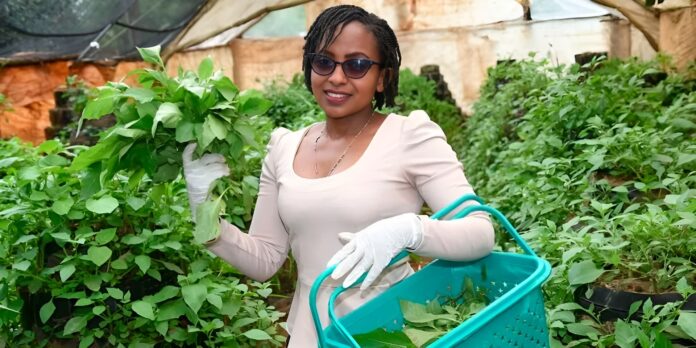Mutile Wambua is a 34-year-old vegetable farmer based in Eldoret. She owns a greenhouse in Yamumbi Village, along the Rivatex-Ndalat road.
She grows various vegetables, such as the Black Nightshade (Managu), Amaranth, Spinach and Dania. She visits her greenhouse daily to check on her crops.
“This is my office. This is where I report every day. It is what I live for,” she states.
From a tender age, Mutile Wambua notes that she’s always had a passion for farming. Above all, she loved organic foods that were safe to eat. Currently, she’s nurturing her dream as a farmer growing organic crops.
“I loved to see seeds breaking the soil and coming out. Besides, I want safer food,” she said.
Mutile Wambua holds a Bachelor’s in Procurement from Moi University. She holds a diploma in the same field from the Chartered Institute of Purchasing & Supply in the United Kingdom.
Currently, she is pursuing her master’s degree in development studies from the catholic University of East Africa.
Mutile first ventured into farming after graduating from Moi University in 2012. She grew tomatoes and vegetables using the traditional method. However, she quit after two years after landing a job.
“I later quit (the job) due to low pay and went back to farming, where I also helped my family run our poultry business,” she recalled.
In 2019, she decided to give farming another go. She farmed her crops on 1/4 acre under drip irrigation. Soon after, Mutile Wambua learned about the benefits of storey gardening from her friend.
In 2022, she took interest in modern farming art and established her 8m by 17m greenhouse into a 65 multi-storey garden. Each storey holds an average of 70 plants.
She has realised the benefits of storey gardening, which include saving space and yielding more returns.
“What a single-storey garden holds would have covered an eighth-acre piece of land,” she confidently states.
“Farming should be urban and modern, especially for us youth who may not have access to land. Besides, using storey gardens makes it easier to manage the drops including by weeding,” Wambua adds.
Mutile Wambua estimates that the greenhouse shelters 4,550 plants occupying an acre. The determinant factor is the spacing between the crops, which can vary occasionally.
Her initial capital to start the storey gardening method was Sh. 20,000. With this, she made 6 storey gardens and bought seeds. She propagated them before moving them to the gardens.
Wambua adds that she had to put up a greenhouse after birds attacked and destroyed her plants.
In a week, Wambui says she harvests between 100 and 200 kilos of vegetables, selling each kilo at Sh. 50.
Mary Njeri: I Quit My Job to Start Poultry Farming
“In a month, I et at least 3200 kilos,” she adds, noting the price volatility during the dry seasons, which may peak to even Sh. 80 per kilo for her veggies.
Wambua utilizes the unconventional yet common method of rabbit urine as both a foliar fertilizer and pesticide. She has also intercropped her crops with red pepper and onions to manage pests and diseases.
Additionally, she combines compost manure and topsoil in equal parts, at a ratio of 50:50, to create an optimal growing medium for her crops.
Mutile runs her farm and manages their family business, which specializes in selling animal feeds, poultry and poultry equipment. She also offers consultancy services on farm management to help other farmers achieve sustainable farming practices.
Mutile looks to have at least 3 more greenhouses in the future as she believes they will help her meet the incessantly growing demand for organic crops.
“Farming is a rewarding venture. There are challenges which require patience and persistence. It is also important to conduct market survey or research before venturing into any farming,” she concludes.
Wambua has employed one worker. She believes her business model will help her upscale. As a parting shot, Mutile advises the youth to consider practising storey gardens as they require little space.









Very encouraging…… I like it